Simply follow our step-by-step tutorial on How to Can Spaghetti Sauce! Canning your spaghetti sauce or marinara sauce is a great way to use your garden-fresh tomatoes. Plus, it ensures that you have homemade spaghetti sauce all year round!
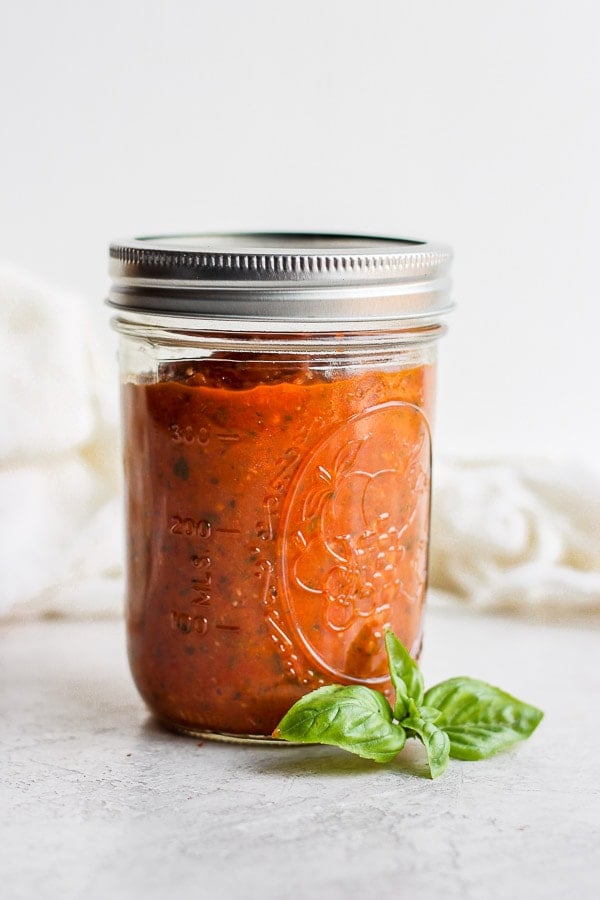
The Best Canned Spaghetti Sauce
First of all, here is the Homemade Roasted Marinara recipe we make every year for canning – it comes highly recommend and is really flexible and forgiving! A family favorite recipe that uses ALL the garden tomatoes and herbs. Plus, it’s super versatile and can be used to make a basic spaghetti, baked Italian meatballs, or the best homemade lasagna!
Looking for More Homemade Pasta Sauces?
If you love them as much as we do, you definitely need to try our Homemade Alfredo Sauce!
Canning + Botulism
First, I am going to direct you to the USDA’s Guide To Home Canning and homecanning.gov, both have great info on home canning and the concern regarding botulism. Botulism is a potentially deadly form of food poisoning that is caused by a bacteria that is actually found in the soil, but it can survive, grow and produce a toxin that can grow inside sealed jars of food – like canned spaghetti sauce. There are a couple of ways to ensure this bacteria is NOT in your food – high heat & acidity. Heat, particularly at certain temperatures and for certain periods of time, can kill that bacteria – this is why a pressure cooker is generally recommended, as it can withstand incredibly high temps and pressure, thus killing off bacteria quickly. Another is acidity. Tomatoes, for example, are very acidic by nature.
Bottom line, the safest way to can any food, tomatoes as well, is to use a pressure cooker, add lemon juice and follow the other guidelines described in the USDA’s Guide.
What You Will Need
Don’t Have a Pressure Cooker?
That’s alright, below I am going to explain the way that we have canned our tomatoes the past several years. It doesn’t involve either a pressure cooker or lemon juice. We take into consideration the amount of acidity in the tomatoes and the fact that our homemade marinara recipe cooks at 425 degrees F for 5 hours, undoubtedly killing off any bacteria, but if any remained, the 45-60 water bath would kill off the rest.
How To Can Spaghetti Sauce
Sterilize. Sterilize. And then sterilize again: With canning, you need to be aware of not only the potential bacteria that may have been in your soil, but also the everyday bacteria we have on our hands and in our kitchens. So, the first thing you need to do is take the jars, lids, rings and funnel (this is included in your Canning Kit) and give them a good wash in hot, soapy water. Then, run them through the sanitizing cycle in your dishwasher (no detergent). Or place them in boiling water for 30 minutes. Once that is complete, set everything on a clean towel.
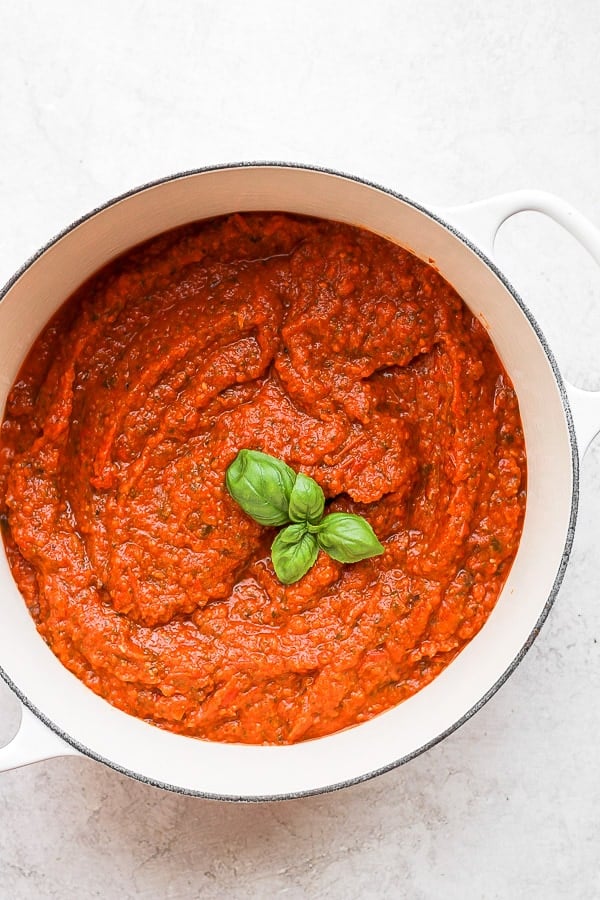
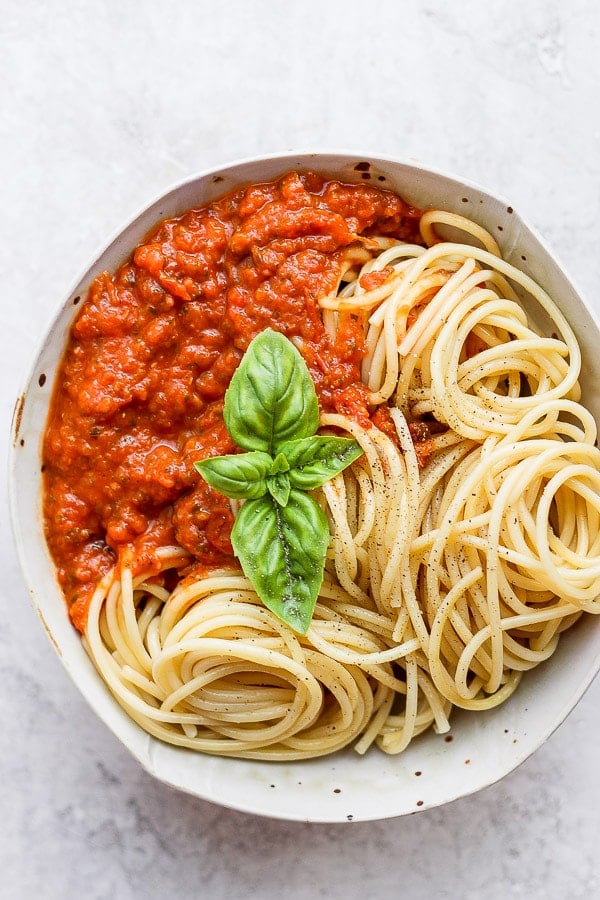
Pour homemade marinara sauce (which has already been in the oven for 5 hours) through a funnel into one of the sanitized jars. Ensure there is a 1/4 inch of space left at the top of the sauce. Use clean towel or paper towel and wipe down the top of the jar. To ensure nothing will prevent a tight seal from occurring. Place seal and ring on top and tighten – use tightener, also included in the Canning Kit. Repeat this step until you have used all of your marinara sauce.
If using a water bath, take the Stainless Steel Canner and fill it about 3/4 full of water. Bring to boil. Place as many jars as you can comfortably fit in the canner. Let sit in boiling water for 45-60 minutes, ensuring there is at least 1 inch of water on top of the jars. After 45 minutes, carefully remove from water and let sit out for 12 hours, listening for each can to “pop”. If they don’t pop, they haven’t sealed correctly and should be discarded.
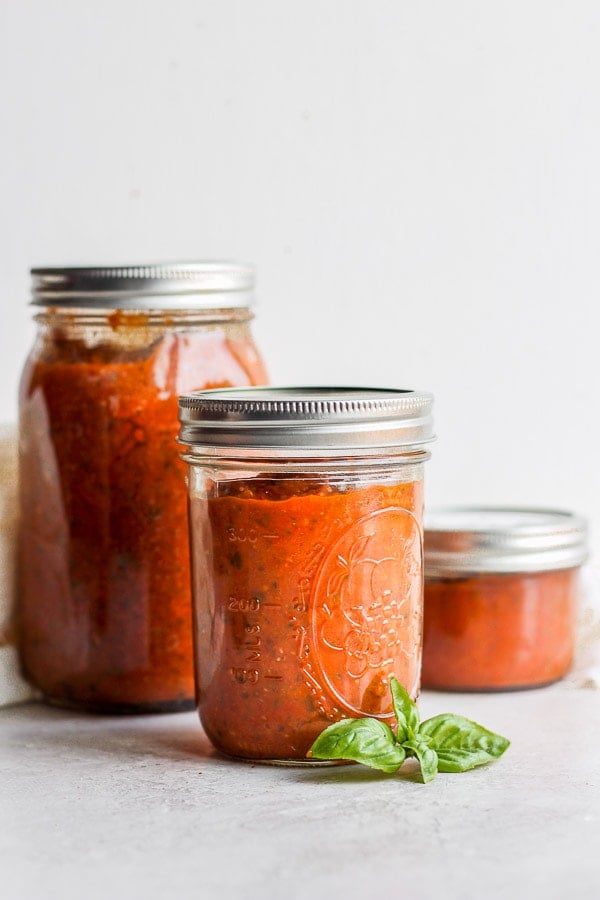
Storage
Once you can your spaghetti sauce it is fine being stored in your pantry for 6 months to 1 year – no need to freeze!
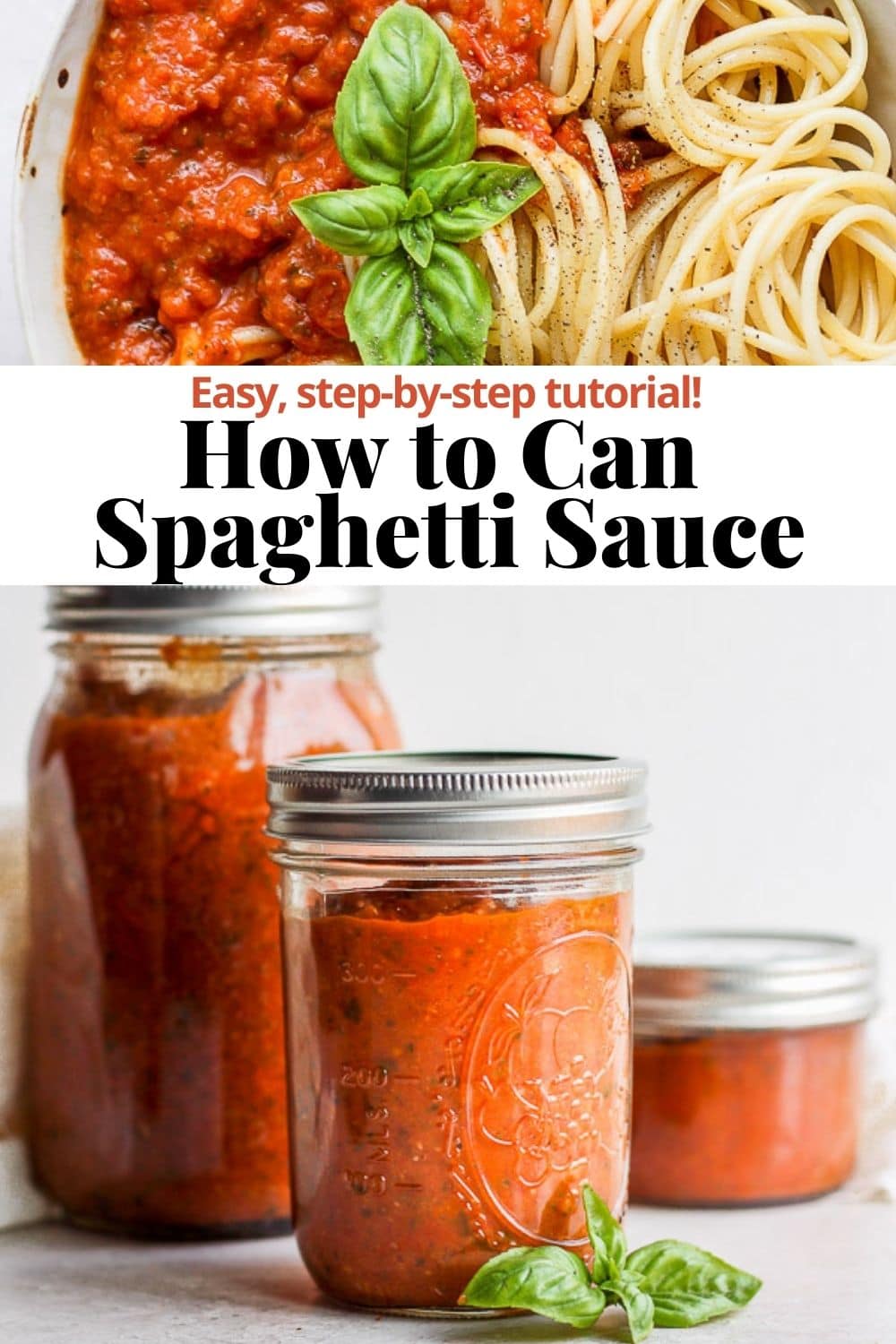
Made this recipe and loved it?! We would love it if you would take a minute and leave a star rating and review – it is also helpful if you made any substitutions or changes to the recipe to share that as well. THANK YOU!
Don’t forget to check out my Instagram and TikTok account for some behind-the-scenes action and subscribe to my YouTube channel for more delicious recipe tutorials! Or give me a follow on Facebook or see what I am pinning on Pinterest!
Other Recipes You Might Like
- Quick Pickled Vegetables
- Chia Seed Jam
- Refrigerator Dill Pickles
- Quick Pickled Red Onions
- Pappardelle Bolognese Sauce
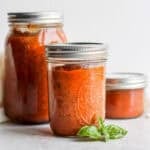
Ingredients
Instructions
- Sterilize: Sterilize. Sterilize. And then sterilize again: With canning, you need to be aware of not only the potential bacteria that may have been in your soil, but also the everyday bacteria we have on our hands and in our kitchens. So, the first thing you need to do is take the jars, lids, rings and funnel (this is included in your Canning Kit) and give them a good wash in hot, soapy water. Then, either run them through the sanitizing cycle in your dishwasher (no detergent) or place them in boiling water for 30 minutes. Once that is complete, set everything on a clean towel.
- Add Sauce: Pour homemade marinara sauce (which has already been in the oven for 5 hours) through a funnel into one of the sanitized jars. Ensure there is a 1/4 inch of space left at the top of the sauce. Use clean towel or paper towel and wipe down the top of the jar to ensure nothing will prevent a tight seal from occurring. Place seal and ring on top and tighten – use tightener, also included in the Canning Kit.
- Continue: Repeat this step until you have used all of your marinara sauce.
- Water Bath: If you are using a water bath, take the Stainless Steel Multi-Use Canner and fill it about 3/4 full of water and bring to boil. Place as many jars as you can comfortably fit in the canner and let sit in boiling water for 45-60 minutes, ensuring there is at least 1 inch of water on top of the jars. After 45 minutes, carefully remove from water and let sit out for 12 hours, listening for each can to “pop”. If they don’t pop, they haven’t sealed correctly and should be discarded.
- Store: Let them cool and then place in the pantry to store for later use!
Notes
- Pop: The mason jar lids have a bubble on the top that will pull down and tighten as the jar sits creating a “pop” sound. This is a great way to know you have a secure seal!
- Sauce: highly recommend our homemade marinara sauce, but any of your favorite sauce recipes will work with this process.

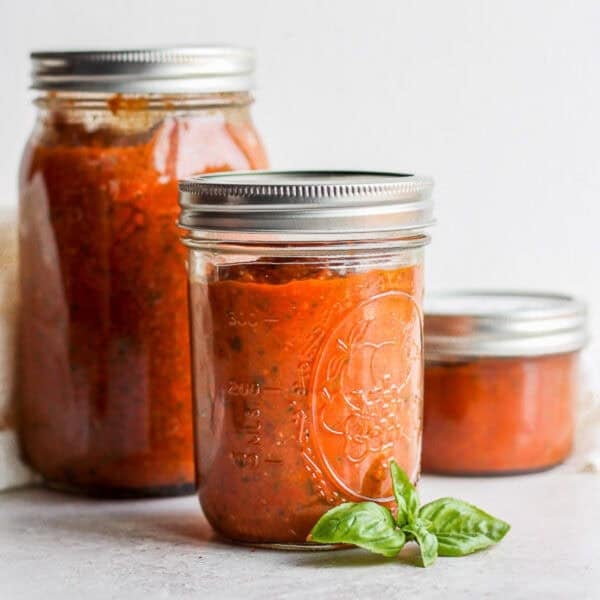
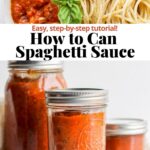
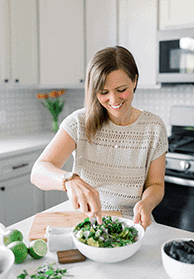





Traci says
I am new to this. I would like to make a big batch of my grandmother’s gravy (sauce). She used canned tomato paste, canned tomato puree (like red pak or contadina), little oil, almost a head of garlic, water, basil, oregano, salt and pepper. Am I able to can this up and use a water bath?
Heidi C. says
If you are still curious… I wouldn’t. It’s safest to freeze something like that. Keeps it fresh and yummy, and no guessing about it being shelf stable.
Arthur Heinrichs says
I make a homemade marinara using canned certified San Marzano whole tomatoes and canned certified San Marzano tomatoe paste. To these I add sauteed onions and garlic along with chopped fresh garlic. Since I am using previously canned produce can I skip the long oven step before canning?
Jenna says
Can you add something like mushrooms and still be able to can?
Erin says
Hi Jenna – yes, adding vegetables is usually fine (I have done zucchini before and it worked great), just don’t add any meat!
Chris says
I use pork sausage in my spaghetti recipe and canned tomato sauce and diced tomatoes with fresh veggies. I want to save the leftover sauce in a jar but I’m not sure how long it will last. Can I use this method too and what’s the shelf life of this?
Valerie says
I make my own sauce (family recipe) in my slow cooker, I would love to be able to make a much bigger batch and can it, but had no idea how to start til now, my only concerns are how do I store them after, fridge, freezer, pantry?
Erin says
It can be stored in the pantry!
Chelsea Koziatek says
Because I had some leftover grilled onion, zucchini, and eggplant, I added it to this marinara after the 5 hours of roasting in the blender section. I’m afraid now that the canned marinara is unsafe because of the vegetable addition and no lemon juice in the recipe. I’m going to throw it out unless someone can convince me it is ok! I’m bummed that I didn’t think about the absence of lemon juice because the marinara is SO GOOD and that was a lot of tomatoes I just possibly wasted. 🙁 Any thoughts??
Erin says
Hi Chelsea! Don’t throw it away! You can still add lemon juice if you want and if you don’t feel safe canning the sauce you can ALWAYS freeze it!
Nancy says
Canspagetti sauce be canned in a hot water bath? I do not have a pressure cooker canner.
Erin says
Hi Nancy! So we have been canning our spaghetti sauce via water bath for a good 8 years or so. We just can it immediately following cooking it (we use the Homemade Roasted Marinara Sauce on the blog which roasts in the oven for 5 hours which kills off any bacteria) and you just have to ensure your jars seal properly, etc. There is so much acidity in tomatoes, but feel free to add some lemon juice to the recipe before canning.
Bri says
Hi! Thanks for all the tips! If I don’t have time to can the sauce immediately after it’s done simmering for 5 hours, can it go in the fridge for the day and be canned later that night?
Erin says
Hi Bri – waiting between cooking and canning allows for the opportunity for bacteria to grow so I would recommend canning immediately!
Norine says
Jars that do not seal need to be discarded. Can they not be refrigerated and used say within a few days?
Erin says
Hi Norine! Such a good question – yes, I should amend that to say if the jars don’t seal you can use them within a few days! Thank you!
Mike Herrin says
Very simple and clear instructions but why pint jars? Why not quart jars?
Erin says
Hi Mike! I think that is just personal preference! Sometimes I feel like when we use quart jars and we open one up to use it, we don’t end up using it all. So we just prefer to (generally) use pint jars for a smaller serving. We do end up using a few quart jars too though! Do what works best for you!